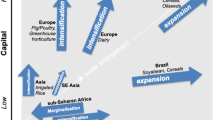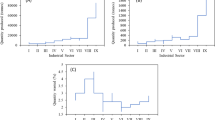Abstract
Continued concern for animal welfare may be alleviated when welfare would be monitored on farms. Monitoring can be characterized as an information system where various stakeholders periodically exchange relevant information. Stakeholders include producers, consumers, retailers, the government, scientists, and others. Valuating animal welfare in the animal-product market chain is regarded as a key challenge to further improve the welfare of farm animals and information on the welfare of animals must, therefore, be assessed objectively, for instance, through monitoring. Interviews with Dutch stakeholder representatives were conducted to identify their perceptions about the monitoring of animal welfare. Stakeholder perceptions were characterized in relation to the specific perspectives of each stakeholder. While producers tend to perceive welfare from a production point of view, consumers will use visual images derived from traditional farming and from the animals’ natural environments. Scientists’ perceptions of animal welfare are affected by the need to measure welfare with quantifiable parameters. Retailers and governments (policy makers) have views of welfare that are derived from their relationships with producers, consumers, non-governmental organizations (NGOs), and scientists. All interviewed stakeholder representatives stated that animal welfare is important. They varied in the extent to which they weighted economic considerations relative to concern for the animals’ welfare. Many stakeholders emphasized the importance of communication in making a monitoring system work. Overall, the perspectives for the development of a sustainable monitoring system that substantially improves farm animal welfare were assessed as being poor in the short term. However, a reliable system could be initiated under certain conditions, such as integrated chains and with influential and motivated stakeholders. A scheme is described with attention points for the development of sustainable monitoring systems for farm animal welfare in the long term.
Similar content being viewed by others
References
Anonymous, “Scientists’ assessment of the impact of housing and management on animal welfare,” Journal of Applied Animal Welfare Science 4 (2001), 1–52
H. Bartussek (1986) ArticleTitleErgänzung zum Artikel ‘Vorschlag für eine Steiermärkische Intensivtierhaltungsverordnung Irdning (1985) Der Österreichische Freiberufstierartzt 97 4–15
H. Bartussek (1999) ArticleTitleA review of the animal needs index (ANI) for the assessment of animals’ well-being in the housing systems for Austrian proprietary products and legislation Livestock Production Science 61 179–192 Occurrence Handle10.1016/S0301-6226(99)00067-6
D. D. Bell (2002) Introduction to the table-egg industry D. Bell W. D. Weaver (Eds) Commercial Chicken Meat and Egg Production Edn 5 Kluwer Dordrecht 945–963
H. J. Blokhuis R. B. Jones R. Geers M. Miele I. Veissier (2003) ArticleTitleMeasuring and monitoring animal welfare: transparency in the food product quality chain Animal Welfare 12 445–455
E. Von Borell F. J. Bockisch W. Buscher S. Hoy J. Krieter C. Muller N. Parvizi T. Richter A. Rudovsky A. Sundrum H. Weghe Particlevan den (2001) ArticleTitleCritical control points for on-farm assessment of pig housing Livestock Production Science 72 177–184 Occurrence Handle10.1016/S0301-6226(01)00278-0
Bracke, M. B. M., Modelling of Animal Welfare: The Development of a Decision Support System to Assess the welfare Status of Pregnant Sows. PhD Thesis (Wageningen University, Wageningen, 2001)
M. B. M. Bracke B. M. Spruijt J. H. M. Metz W. G. P. Schouten (2002a) ArticleTitleDecision support system for overall welfare assessment in pregnant sows A: Model structure and weighting procedure Journal of Animal Science 8 1819–1834
M. B. M. Bracke J. H. M. Metz B. M. Spruijt W. G. P. Schouten (2002b) ArticleTitleDecision support system for overall welfare assessment in pregnant sows B: Validation by expert opinion Journal Animal Science 8 1835–1845
Cornelissen, T., The Two Faces of Sustainability – Fuzzy Evaluation of Sustainable Development, PhD Thesis (Wageningen University, Wageningen, 2003)
Dagevos, J. C., Panorama Voedingsland. Traditie en transitie in discussies over voedsel {Panarama Foodcountry. Tradition and transition in discussions about food} (Rathenau Instituut, The Hague, 2002)
De Jonge, F. H. and G. A. Goewie, In het Belang van het Dier: Over het Welzijn van Dieren in de Veehouderij {In the interest of the animal: about animal welfare in livestock production} (Rathenau Instituut, The Hague, 2000)
M. R. Greenwood (2001) ArticleTitleCommunity as a stakeholder. Focussing on corporate social and environmental reporting Journal of Corporate Citizenship 4 31–45
LNV, Houden van dieren – Beleidsvoornemen dierenwelzijn. {Keeping animals – Policyintention animal welfare} (LNV, The Hague, 2001)
LNV, Beleidsnota Dierenwelzijn {Animal Welfare Policy Memorandum, March 2002). (LNV, The Hague, 2002)
J. A. Mench (2003) ArticleTitleAssessing animal welfare at the farm and group level: A United States perspective Animal Welfare 12 493–503
M. Mendl (1991) ArticleTitleSome problems with the concept of a cut-off point for determining when an animal’s welfare is at risk Applied Animal Behaviour Science 31 139–146 Occurrence Handle10.1016/0168-1591(91)90161-P
R. K. Mitchell B. R. Agle D. J. Wood (1997) ArticleTitleToward a theory of stakeholder identification and salience: Defining the principle of who and what really counts Academy of Management Review 22 853–886
National Pork Board, Pork checkoff Swine Welfare Assurance Programmesm. A Program of Amerika’s Pork Producers. Communications packet (2003).
Report Wijffels, Toekomst voor de veehouderij. Agenda voor een herontwerp van de sector {Future for livestock production. Agenda for a redesign of the sector} Report of the Comission (Wijffels, The Hague, 2001)
P. H. Rossi H. E. Freeman (1989) Evaluation. A Systematic Approach (Sage Publications Inc. Newbury Park, CA
Sundrum, A., R. Andersson, G. Postler, H. Schneider, A. Striezel, J. Walter, and C. Winckler, Tiergerechtheitsindex – 200. Ein Leitfaden zur Beurteilung von Haltungssystemen {Animal Needs Index – 2. A guide to assess housing systems} (Bonn, Kollen Druck, 1994)
Ter Berg, J., J. Fransen, and D. Verhue, Burgeroordelen over de veehouderij: Uitkomsten burgerpanels. Belangrijkste uitkomsten van groepsdiscussies en werkbezoeken aan viskwekerijen, melkveehouderijen en konijnenhouderijen (Citizen judgements about livestock production: results from citizen panels. Main results from group discussions and visits to fish farms, dairy farms and rabbit farms) Conducted by Veldkamp (Rathenau, The Hague, 2003)
H. M. Te Velde M. N. C. Aarts C. M. J. Woerkum Particlevan (2001) Eten, maar niet willen weten. Veehouders en consumenten over de omgang met dieren in de veehouderij Eating, but not wanting to know. Farmers and consumers about the treatment of animals in livestock production Rathenau Instituut The Hague
Verhue, D. and D. Verzijden Burgeroordelen over de veehouderij: Uitkomsten publieksonderzoek. Een onderzoek naar het oordeel van de burger over de melkveehouderij, viskwekerij en konijnenhouderij (Citizen judgements about livestock production: Results from an opinion poll. Research about the judgement of the citizen about dairy farming, fish farming and rabbit farming) Conducted by Veldkamp (The Hague, Rathenau, 2003)
H. R. Whay D. C. J. Main L. E. Green A. J. F. Webster (2003) ArticleTitleAssessment of the welfare of dairy cattle using animal-based measurements: direct observations and investigation of farm records Veterinary Record 153 197–202
P. R. Wiepkema (1987) Behavioural aspects of stress P. R. Wiepkema P. W. M. Adrichem Particlevan (Eds) Biology of Stress in Farm Animals: An Integrative Approach Martinus Nijhoff Dordrecht 113–133
Author information
Authors and Affiliations
Corresponding author
Rights and permissions
About this article
Cite this article
Bracke, M.B.M., Greef, K.H.D. & Hopster, H. Qualitative Stakeholder Analysis for the Development of Sustainable Monitoring Systems for Farm Animal Welfare. J Agric Environ Ethics 18, 27–56 (2005). https://doi.org/10.1007/s10806-004-3085-2
Accepted:
Issue Date:
DOI: https://doi.org/10.1007/s10806-004-3085-2




